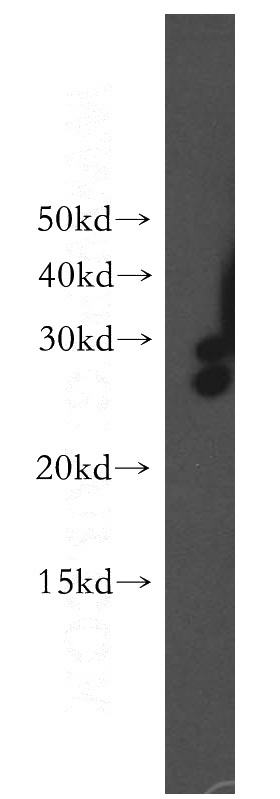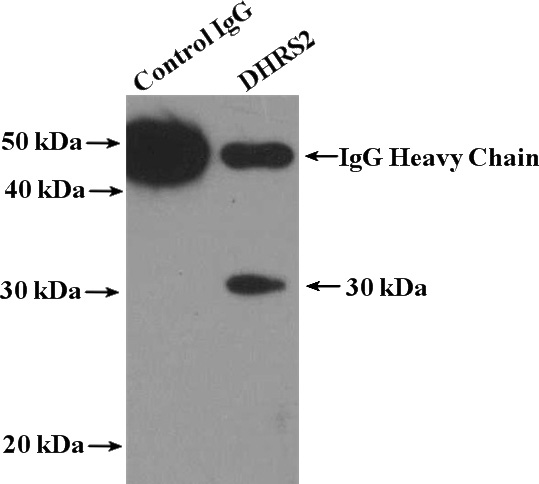-
Product Name
DHRS2 antibody
- Documents
-
Description
DHRS2 Rabbit Polyclonal antibody. Positive IP detected in HeLa cells. Positive WB detected in human liver tissue. Observed molecular weight by Western-blot: 30 kDa
-
Tested applications
ELISA, WB, IP
-
Species reactivity
Human; other species not tested.
-
Alternative names
DHRS2 antibody; Dicarbonyl reductase HEP27 antibody; HEP27 antibody; Protein D antibody; SDR25C1 antibody
-
Isotype
Rabbit IgG
-
Preparation
This antibody was obtained by immunization of DHRS2 recombinant protein (Accession Number: BC007339). Purification method: Antigen affinity purified.
-
Clonality
Polyclonal
-
Formulation
PBS with 0.02% sodium azide and 50% glycerol pH 7.3.
-
Storage instructions
Store at -20℃. DO NOT ALIQUOT
-
Applications
Recommended Dilution:
WB: 1:500-1:5000
IP: 1:200-1:1000
-
Validations

human liver tissue were subjected to SDS PAGE followed by western blot with Catalog No:109923(DHRS2 antibody) at dilution of 1:500

IP Result of anti-DHRS2 (IP:Catalog No:109923, 4ug; Detection:Catalog No:109923 1:300) with HeLa cells lysate 4000ug.
-
Background
DHRS2(Dehydrogenase/reductase SDR family member 2) is also named as dicarbonyl reductase HEP27, Protein D and belongs to the short-chain dehydrogenases/reductases (SDR) family. It displays NADPH-dependent dicarbonyl reductase activity in vitro with 3,4-Hexanedione, 2,3-Heptanedione and 1-Phenyl-1,2-propanedione as substrates and there is no reductase activity displayed in vitro with steroids, retinoids and sugars as substrates. This protein also may inhibit cell replication. It has 2 isoforms produced by alternative splicing with the molecular weight of 27 kDa and 29 kDa.
Related Products / Services
Please note: All products are "FOR RESEARCH USE ONLY AND ARE NOT INTENDED FOR DIAGNOSTIC OR THERAPEUTIC USE"
